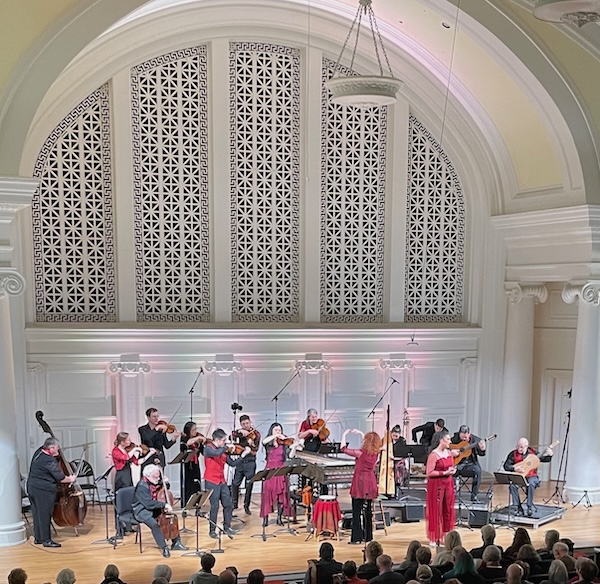Apollo’s Fire wraps season with lively jam session of Spanish early music

The Cleveland-based baroque band Apollo’s Fire brought its third season of Chicago-area performances to an exhilarating close Sunday afternoon at Evanston’s Nichols Concert Hall with a lively and fascinating exploration of the vast diaspora of early musical culture that progressed from North Africa to Spain to the colonial Americas and back.
The program bore the title “Hispania!,” the ancient Roman name for the Iberian peninsula, home to a variety of peoples (including, for nearly 800 years, the Moors) and vibrant cultures that, as Jeannette Sorrell observed in her introductory remarks, made Iberian baroque music conspicuously different from that of the rest of Europe.
Presiding over the sold-out concert with her usual smiling, stylish vitality, the group’s founder, director and harpsichordist lent rattles of tambourine and an additional singing voice to the Spanish folkloric rhythms that her brilliant, 13-member ensemble of period instrumentalists seized with infectious gusto. All of the flavorsome arrangements were hers, as were the informative program notes.
The primary vocal duties were assumed by two superb artists. The Puerto Rican-American soprano Sophia Burgos possesses a sensuous, strikingly beautiful, deeply expressive voice. Having grown up in Chicago’s Puerto Rican community, she was making her first professional concert appearance in her hometown.
Her rich burgundy timbre contrasted nicely with the crisp, shining clarity that the Mexican-American soprano Andrea Walker, also a firmly committed interpreter of Spanish vocal literature, brought to her portions of the program. Both singers displayed immaculate diction and were never less than mesmerizing as they drew listeners deeply into a potpourri of largely unfamiliar Spanish vocal and instrumental music spanning the 16th to 20th centuries.
Part one of the program consisted of a mini-musical travelogue of ancient Spain whose vibrant and diverse music was indelibly influenced by Arabic/North African, Sephardic Jewish and Romani (gypsy) folk and classical elements.
Sorrell’s arrangement of the traditional Catalan Song of the Birds—the melody carried on baroque fiddles including the vielle, then by the two vocal soloists and finally by the full ensemble—segued into a 13th-century Galician cantiga in honor of the Virgin Mary. The colorful arrangement and performance captured the vibrancy of Spanish street festivals still seen today. Indeed, the entire ensemble of strings and plucked instruments pitched in with foot-stamping glee.
The band’s superb cellist, Rene Schiffer, helped turn composer Diego Ortiz’s recercada (variations) on a lively Italian dance into what sounded like a kind of Spanish late-Renaissance hoedown. Much the same heady joie de vivre pervaded a party song for Carnival by the Renaissance composer Juan del Encina, sung by Burgos and Walker with winning spontaneity.
The first half of “Hispania!” was further highlighted by Burgos’ rendition of an anonymous 17th century Peruvian ballad about romance and laughter. One hardly needed to follow the translation to understand what the lyrics expressed, so confiding was her vocal storytelling. No less vivid was the 17th century Mexican composer Juan Gutierrez de Padilla’s bravura villancico on a Christmas theme, nicely dispatched by the singers. This was followed by an instrumental xacara that had the instrumentalists swaying and tapping feet in time with the catchy dance rhythms.
Remaining segments of the program celebrated the stylistic cross-pollination between baroque and folk music in Spain and the Americas. Sorrell and friends kicked up collective heels in fandangos from Spain and 17thand 18th century South America before favoring the audience with a traditional Sephardic ballad along with diverse musical reflections on love and life from over the centuries.
The other guest artist was the virtuosic classical and flamenco guitarist Jeremias Garcia, who dispatched with enormous flair a fandango from the Huelva region in duet with ensemble member William Simms’ baroque guitar, also a rousing flamenco piece, Capricho Arabe, by Francisco Tarrega.
Burgos, who appeared to have been holding her voice in slight reserve earlier, cut loose with Nani Nani, a traditional Sephardic Ladino ballad, her voice reaching an ecstatic high before descending to the depths of sadness—a true vocal tour de force. An arrangement of a 17th century Spanish “party song” by Juan Aranes, alive with the rhythmic syncopations of the folk chaconas heard in village celebrations during the baroque, capped off a flawless concert delightfully.
The visiting Apollo’s Fire has secured an indispensable place in the fabric of the Chicago area’s early-music life, proving a worthy successor to the late, lamented homegrown period ensembles Third Coast Baroque and Baroque Band.
The program will be repeated 7 p.m. Monday at the Art Institute of Chicago.
The group’s 2024-25 season, to be presented at locations in Evanston and downtown Chicago, will include Handel’s Messiah and Bach’s Mass in B minor. apollosfire.org
Posted in Performances





Posted Mar 27, 2024 at 8:45 am by david m novak
Thrilling, innovative, and great fun. Perhaps it is this type of concert that can revivify interest in serious music in Chicago.
I attended the Monday evening performance and will without doubt be back next year. Spread the word about this group!
Posted Apr 07, 2024 at 12:30 pm by Lawrie Dean
Enchanting, amazing. For this baroque enthusiast no longer able to commute to Europe to follow the work of William Christie and Les Arts Florissants and frequent the myriad small venue performances, Hispania gave me hope of more wonders here in Chicago. A truly memorable evening!